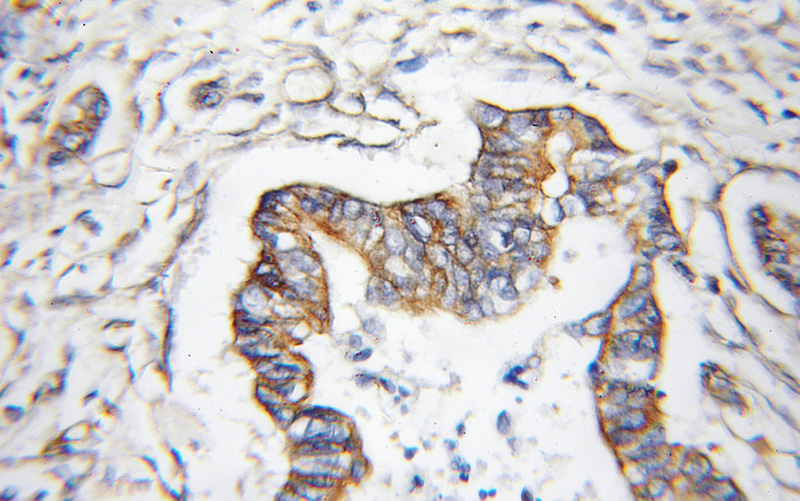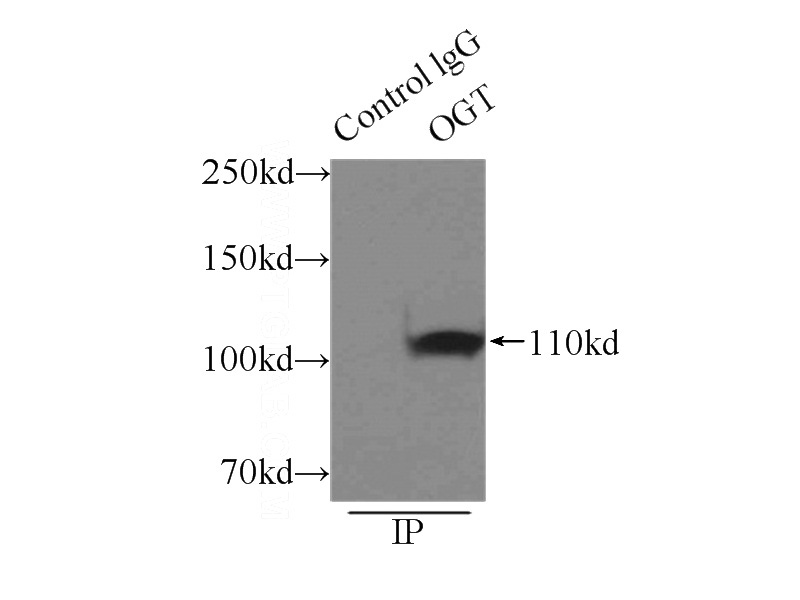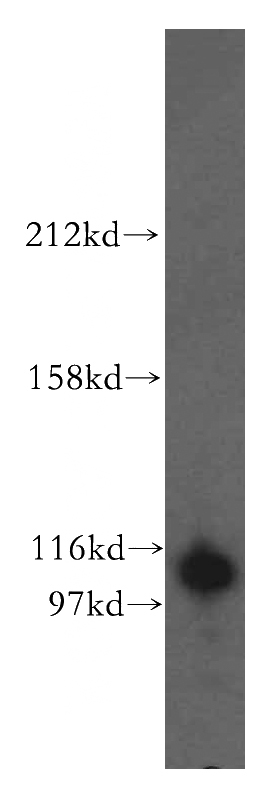-
Product Name
OGT antibody
- Documents
-
Description
OGT Rabbit Polyclonal antibody. Positive IHC detected in human pancreas cancer tissue. Positive IP detected in mouse brain tissue. Positive WB detected in human brain tissue, human liver tissue, mouse brain tissue, mouse liver tissue, rat brain tissue. Observed molecular weight by Western-blot: 110kd
-
Tested applications
ELISA, WB, IHC, IP
-
Species reactivity
Human,Mouse,Rat; other species not tested.
-
Alternative names
HRNT1 antibody; O GLCNAC antibody; OGT antibody
-
Isotype
Rabbit IgG
-
Preparation
This antibody was obtained by immunization of OGT recombinant protein (Accession Number: NM_181673). Purification method: Antigen affinity purified.
-
Clonality
Polyclonal
-
Formulation
PBS with 0.1% sodium azide and 50% glycerol pH 7.3.
-
Storage instructions
Store at -20℃. DO NOT ALIQUOT
-
Applications
Recommended Dilution:
WB: 1:500-1:5000
IP: 1:500-1:5000
IHC: 1:20-1:200
-
Validations

Immunohistochemical of paraffin-embedded human pancreas cancer using Catalog No:113336(OGT antibody) at dilution of 1:50 (under 10x lens)

IP Result of anti-OGT (IP:Catalog No:113336, 3ug; Detection:Catalog No:113336 1:1000) with mouse brain tissue lysate 8000ug.

human brain tissue were subjected to SDS PAGE followed by western blot with Catalog No:113336(OGT antibody) at dilution of 1:500
-
Background
O-linked N-acetylglucosamine transferase (OGT) catalyzes the attachment of N-acetylglucosamine (GlcNAc) monosaccharides to the hydroxyl group of serine or threonine residues of numerous nuclear and cytoplasmic proteins and may play important roles in a large number of diverse intracellular processes ranging from translational control, transcription, transcriptional repression, insulin resistance and regulation of the cell cycle. It exists as a heterotrimeric complex with two 110 kDa and one 70 kDa subunits. Recent studies have shown that O-GlcNAcylation plays essential roles in cancer formation and progression. O-GlcNAcylation as well as OGT expression was found to be significantly elevated in the cancer tissues.
-
References
- Zhu Q, Zhou L, Yang Z. O-GlcNAcylation plays a role in tumor recurrence of hepatocellular carcinoma following liver transplantation. Medical oncology (Northwood, London, England). 29(2):985-93. 2012.
- Qiao Z, Dang C, Zhou B. O-linked N-acetylglucosamine transferase (OGT) is overexpressed and promotes O-linked protein glycosylation in esophageal squamous cell carcinoma. Journal of biomedical research. 26(4):268-73. 2012.
- Guo X, Shang J, Deng Y, Yuan X, Zhu D, Liu H. Alterations in left ventricular function during intermittent hypoxia: Possible involvement of O-GlcNAc protein and MAPK signaling. International journal of molecular medicine. 36(1):150-8. 2015.
- Chun WJ, Nah DY, Bae JH, Chung JW, Lee H, Moon IS. Glucose-insulin-potassium solution protects ventricular myocytes of neonatal rat in an in vitro coverslip ischemia/reperfusion model. Korean circulation journal. 45(3):234-41. 2015.
- Zhang L, Ren F, Li J, Ma X, Wang P. A Modified Coupled Enzyme Method for O-linked GlcNAc Transferase Activity Assay. Biological procedures online. 11:170-83. 2009.
Related Products / Services
Please note: All products are "FOR RESEARCH USE ONLY AND ARE NOT INTENDED FOR DIAGNOSTIC OR THERAPEUTIC USE"
